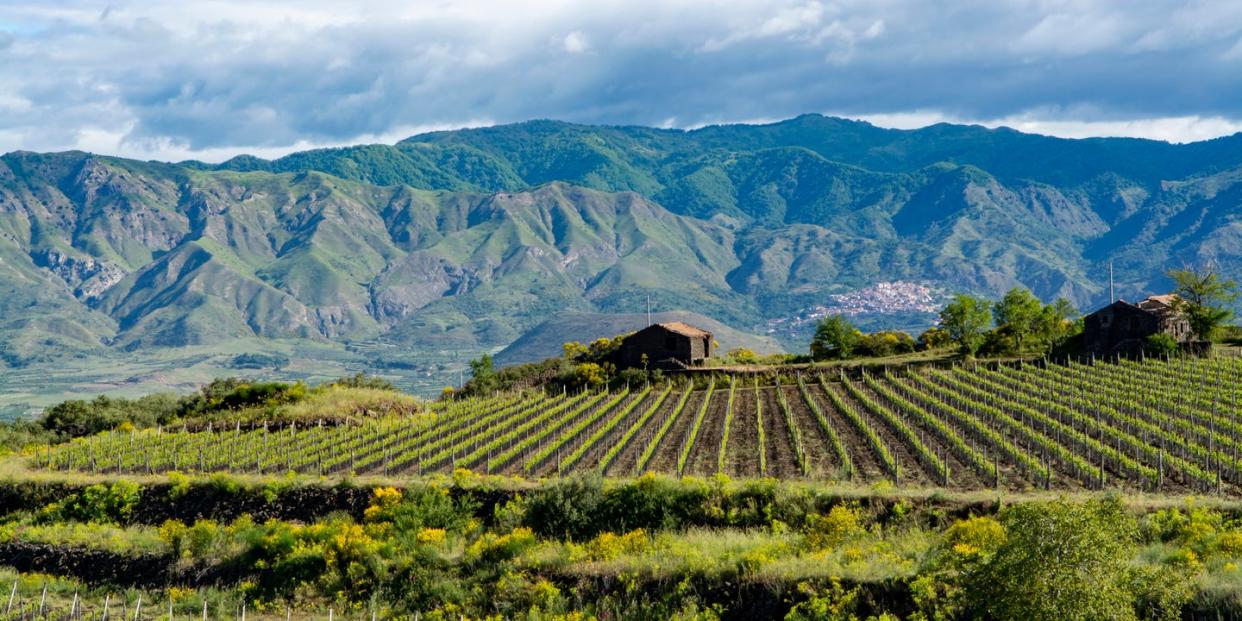Is Sicily the Underrated Wine Capital of the World?

When oenophiles think about Italy, it is almost second nature to think about the wine varieties associated with each region. Piedmont has barolo. Tuscany has Chianti. But, when thinking about Sicily, many are left questioning what its hallmark drink is. Trent Stewart, co-owner of Golden Age Wine in Birmingham, Alabama, would tell any wine enthusiasts there's a better question to ask though—what wine doesn't Sicily have?
In recent years, the Italian island has been producing some of the most interesting wines in all of Europe. While that may come as a shock to some, Stewart is quick to point out that Sicily has many different factors at play that come together to make the ideal location for viticultural experimentation.
"When we think of Italian wine, we tend to think of full-bodied reds and very tannin-forward blends," says Stewart. "Sicilian estates have a bit more freedom to experiment with wine styles and methods of production. As far as natural winemaking, Sicily is one of the places that are somewhat of a hotbed for more natural and white wine producers."
Winemaking in Sicily is by no means a new practice. The tradition actually dates back to around 4000 BC when the Greeks brought their viticultural techniques to the Mediterranean island. Winemaking carried over throughout the centuries with noble families cultivating their own vineyards.
By the 1900s, bulk production of table wines had taken over the Sicilian wine scene as farmers began planting more international varieties of grapes to meet global needs. In particular, Marsala wine became one of the island's most popular exports, but as the demand for fortified wines has sharply decreased, many vineyards on the western side of the island needed to pivot their methods. Over the last decade, local farmers started turning their attention back to those native grape varieties planted centuries ago to develop blends unique to the wine world. "A lot of those producers transitioned to making dry white wine from those same native white grape varieties used for Marsala," says Stewart.
Stewart also explains that the diverse topography of the island contributes to the region's unexpected, yet well rounded profile. Since Sicily is a Mediterranean island, many would expect it to experience extremely hot temperatures. However, due to its elevation, some parts of the island like Mount Etna have more of an alpine-like environment with a lot of direct sunlight and rainfall.
Compared to other areas of Sicily, Etna has garnered much attention over the years for its unique terroir and methods of production. The vines actually grow on the slopes of an active volcano and the soil is enriched with volcanic lava, often giving the wines mineral and smoke notes with high acidity.
Red wines from this area are typically made from a blend of nerello mascalese and nerello cappuccio grapes, which usually create a full-bodied wine with a slightly spicy undertone. However, the nerello mascalese grape can also be utilized to create a more refreshing drink that has more red fruit and rose characteristics with a slight tannin undertone.
The Vittoria terroir, which sits at a lower elevation with terra rossa-enriched (read: red) soil, has also emerged as a leading producer of red wine. Nero d’avola is one of the most commonly used grapes in this region for its ability to make darker and more powerful wines with dark plum undertones. Whereas Vittoria's other most popular red grape, frappato, tends to lean on the more delicate, ethereal side with soft cherry flavor. Many frappato-based wines chill very well, leading to a lighter red that can be enjoyed in the warmer months.
Stewart also points out white wines from the the Western side of the island should not be overlooked. "When people ask about Italian wine, they tend to be looking for red wines, but I am as likely to show them a bottle of white from Sicily," he says. "The white wine blends are just as fascinating due to their slightly salty qualities from the island's coastal environment."
Countless winemakers throughout Sicily have also turned their attention to making rosé and orange wines as those categories grow more in the marketplace. With so much diversity in the types of wine varieties coming from the Italian island, it's almost certain that everyone can find a bottle that fits their needs and taste.
"If someone walks into the shop with a particular flavor profile in mind, I can always find a Sicilian wine for that," says Stewart. "If they tell me they like pinot noir, I can find a Sicilian wine they're going to like. A fan of salty white wines? I got plenty of Sicilian wines for you. "
You Might Also Like

